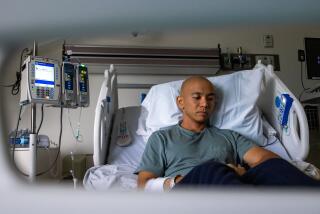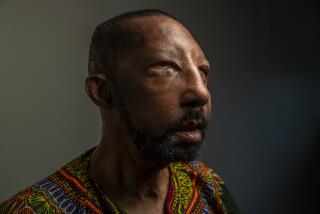Heart Recipient Grateful for Gift of Life
- Share via
Ernie Terry’s heart was so weak that she had to sleep sitting up to keep breathing. Slowly, breath by breath, she was dying.
But one year ago today, she received a call that the heart of a 14-year-old girl was available for her at UCLA Medical Center.
Now, recovering well from a successful heart transplant that day and grateful for her own second chance at life, she is doing her best to educate others on the need for donors for organ transplants.
“I was not given life once, but twice,” the 57-year-old Oxnard woman said during a recent interview, tears welling up in her eyes.
“I think about the family of the girl whose young heart I have, a family who, through all their sorrow, thought to give life to another person.”
In the year since her surgery, she has worked through her church to help more people receive the gift of life through organ donation.
Terry, who is African American, has learned during her own ordeal that kidneys--unlike hearts--must be transplanted between people of similar ethnic backgrounds. Consequently, experts say, blacks and other minorities must often wait longer for transplants.
“Blacks just don’t think about organ donation,” Terry said.
Many worry that doctors would not work as hard to save them if they knew they had agreed ahead of time to be donors, she said. They also fear that the body would be mutilated or that the organs would go only to the rich.
“That’s just not true,” she said. “I want to help educate people in the black community. We need to contribute our part for anyone who might be in need of organs.”
*
People in need of donor hearts outnumber the available organs nearly two to one, statistics from the Regional Organ Procurement Agency of Southern California show. In 1994, 3,000 adults and children died while waiting for transplants in the United States, the organization said.
Because organs are matched based on blood factors and size, and allocated on the basis of need, it is difficult to calculate the average wait, said Debra Maurer, manager of the agency. But Terry’s wait was prolonged by months because of problems in her own life and health.
Suffering from cardiomyopathy, her heart gradually weakened over several years beginning in her 40s, pumping less and less blood, leaving her more and more exhausted. First she quit her second job, where she worked as a billing clerk for an ambulance company. Then she cut back her hours at her full-time job at Target Stores in Oxnard, where she worked as a floor manager. Eventually, she could not work at all.
The company insurance plan carried her for 18 months. But the transitional plan, which came into effect as her health was deteriorating rapidly, did not want to pay for a transplant, or would pay only if she went to Northern California. The plan that was to take over after that one would cover the surgery only if she went to UCLA.
*
“That really took some negotiating,” said her cardiologist, Dr. Ross DiBernardo, now president of medical affairs at Mercy Health Care of Ventura County, which owns St. John’s Regional Medical Center in Oxnard. “But eventually, we got them to do what was best for the patient.”
Finally, the insurance approved the operation. The next step was to wait for an available heart.
Terry received three calls saying that a donor heart was available. The first call came early last year. But it came only eight days after her mother had died after repeated strokes and one day after her father had died of cancer.
“I couldn’t go to the hospital,” she said. “I was in no shape to go.”
After the deaths of her parents, Terry fell ill with pneumonia and later bronchitis. About that same time, she was notified again that a heart was ready for her. But only minutes before surgery, doctors found that her lungs were still filled with fluid from the pneumonia. She was sent home to wait again.
“She had to wait much longer than I wanted her to,” DiBernardo said. “I was afraid she wouldn’t make it.”
Then, on Aug. 13, 1994, a third call came. And this time Terry was ready.
“I got to the hospital at 8 a.m. and was in surgery by 11. Two days later I was up and walking,” Terry said.
She never worried that the operation would fail, she said. And the only remotely negative side effect of the surgery has been the 40 pounds she gained because of the medication she took to help prevent rejection of the donor heart.
Although she must continue to take other medications for life, last week was the end for the steroids that encouraged weight gain, she said.
*
Since her surgery, Terry, a mother of three grown daughters, has worked through her congregation at the Bethel African Methodist Episcopal Church in Oxnard to educate others in her parish.
One of Terry’s daughters, Leslie Terry Pimentel, said her mother is a giving person who likes helping others.
“She’s also a very strong person,” said Pimentel, an elementary teacher in El Rio. “One of the characteristics that helped her come through her transplant is that she is so strong and her faith is so strong.”
Terry’s doctor has still not released her to return to work, and she is unsure of her future. But for now, she is happy to be working as a volunteer to encourage people to become organ donors.
“What’s better than giving life to someone else?” she asked. “I just feel really blessed that I have another chance at life.”
More to Read
Sign up for Essential California
The most important California stories and recommendations in your inbox every morning.
You may occasionally receive promotional content from the Los Angeles Times.










